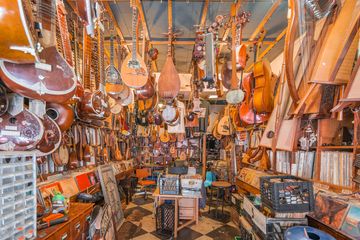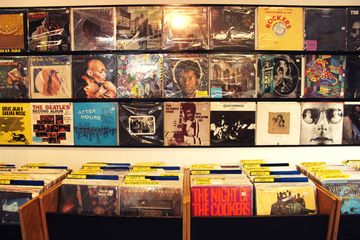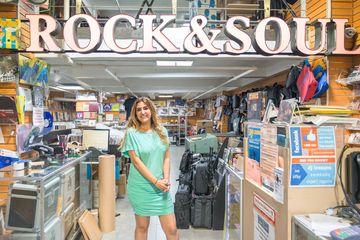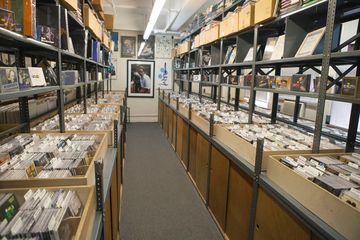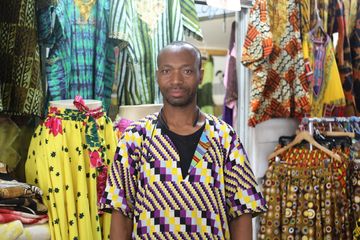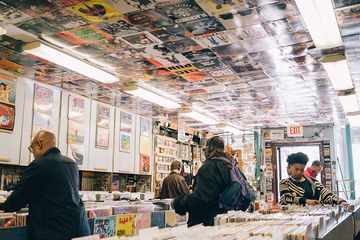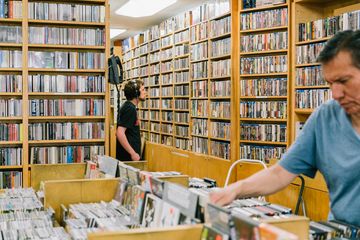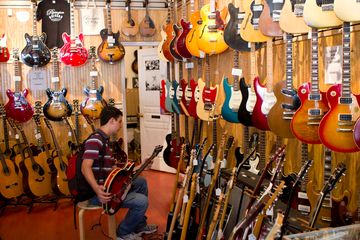Sharon’s family was not exactly in the business of music; they were in the business of giving people what they wanted. They emigrated from Israel in the early 1970s with nothing to their names and the hope of making a living and a better life. As electronics were the rage at the time, they opened a consumer electronics shop in 1975. But, as Sharon said, “they were smart about it. ” As the years went on, the demand for music and records began to rise, and, accordingly, Sharon’s family began selling records and record players in their shop. Rock and Soul became one of the first record and DJ stores. Through the golden age of the record, business boomed, and Rock and Soul reached many loyal customers. In the late 1980s, however, the record industry hit an all-too-well-known speed bump: the CD. As consumers of records began to fall from the grid, record stores followed suit. In an almost twenty-year dry spell, Rock and Soul was one of the only stores that continued to sell records. “We didn’t have the heart to let go, ” Sharon, now the store manager, explained. But it was the DJ equipment the store sold that kept it afloat. Rock and Soul is covered wall-to-wall in music equipment, from microphones to amplifiers to records and cover art. Boxes of records are crammed into the back, with listening stations in the corner. The day I was there, electronic music was blasting from a loft above. I had walked in on one of the store’s frequent “Scratch Pad Popup” events, during which DJs come in to play records on the store’s equipment and network with each other. “We care about sound, ” said Sharon. “Anything related to sound. ”In an age where any and all music is but a click away, Sharon acknowledged that people who buy records often do so for the aesthetic value. “It’s a different kind of person buying records, ” she said. “It’s someone looking for cool cover art, maybe something to hang up in their room. ” Colored records, in fact, are generally intended for display - it is frowned upon to play (and potentially scratch) them. But Sharon also emphasized the unique auditory value of record music. “Listen to a record and you’ll hear the whole picture, ” she said. “The keyboard, the saxophone: it’s all richer. You’re hearing it the way it’s meant to be heard. ” She noted that modern records are thicker than they have been in years past, delivering an even higher quality of sound. Such value translates to DJ work as well, according to Shawn McAdams, a frequent customer of Rock and Soul. Shawn has been a DJ since 1993, and is known in the DJ world as “Right On Shawn. ” More importantly, he is a DJ who uses records. “With DJs, ” he said, “people like to see the artwork. It’s so boring to see a guy just sitting on his laptop. ” But he admits that his methods are sometimes a surprise. “People often ask me, ‘Do they still make records? ’” he laughed. “That’s my favorite. ”The listening stations at Rock and Soul, it seems, are a DJ’s best friend. “I just play different things, ” said Shawn of his music choice, as he hefted a large stack of records onto the counter. “You listen until you find stuff that sounds good. ”Keith Dumpson is a record salesman at Rock and Soul, and has been for over forty years. Before that, he was working at a record store on 117th street, where he met people in the industry and learned how to produce music. His days were busy: “I would get up at five, work hard all day, and then work hard in the studio after. ” The opportunity to work at Rock and Soul, he said, changed his life. “They tested me out alphabetizing records, ” he recalled of the interview. “And I knew how to do that. I knew all the songs. ”Keith had a lot to say about the state of the music industry. “The technology today, it makes you lazy, ” he said. “Now you push a button, something comes out, and everyone’s cheering. ” He believes this has decreased the quality of music throughout his lifetime. “The new music ain’t happening. Years ago, music was a lot better. It was all records back then, and vinyl was cheaper. Hip hop was cleaner and made more sense. There’s no more real musicians like there used to be back in the day. Now the songs make no sense. A cat swallowing a razor blade is a hit. People today have no spirit of song. ”“Except for Beyonce, ” he quickly clarified. The sound afforded by the record, Keith believes, is necessary for good music. “It’s not just pushing buttons on there, ” he said. “It’s playing instruments. Music. ” Even with records making a comeback, the ease of downloading still makes it difficult for stores like Rock and Soul to keep their doors open. Though they have DJ equipment sales to carry it along, other stores are not so lucky. “You’ve got to shop in the store, ” said Sharon. “You can’t purchase online. " For shops like these, it is the in-person, non-digital customers who keep them in business.
